MercoPress. South Atlantic News Agency
Politics
-
Saturday, December 7th 2019 - 09:40 UTC
Guyana optimistic it will win the Esequibo dispute at the International Court of Justice
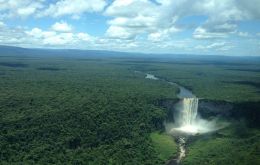
President David Granger is optimistic that the International Court of Justice (ICJ) will dispense a ruling in Guyana’s favor in the border case with Venezuela. The Guyanese president expressed these sentiments while appearing on the popular radio program, Hot Seat.
-
Saturday, December 7th 2019 - 09:39 UTC
Rising cost of meat pushes Brazil's November inflation to a high month-on-month increase

Brazilian consumer price inflation bounced back to seven-month highs in November from ultra-low levels the month before, led by the rising cost of meat and regulated prices like electricity, official figures showed on Friday.
-
Saturday, December 7th 2019 - 09:32 UTC
Peru agrees to promote US investments in the country to counter Beijing influence

Lima and Washington are in the final stages of talks on a deal to promote American investments in Peru as part of a U.S. initiative to counter Chinese influence in the region, Peruvian diplomatic sources said.
-
Saturday, December 7th 2019 - 09:26 UTC
HMS Forth on its way for deployment to the Falklands; she will replace HMS Clyde
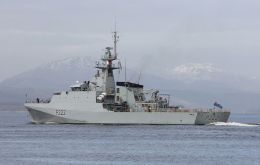
The British Royal Navy’s next-generation offshore patrol vessel HMS Forth is on its way for deployment to the Falkland Islands, after a brief call in Gibraltar. The long-term deployment of HMS Forth will see the ship act as the guardian of the Falkland Islands and Britain’s South Atlantic territories.
-
Saturday, December 7th 2019 - 09:25 UTC
Falklands' Governor agrees to extend his time to four years, until September 2021

The Falkland Islands' Governor Nigel Phillips CBE and Mrs. Emma Phillips have agreed to extend their time in the Islands to four years. The announcement was done on Friday by Government House.
-
Friday, December 6th 2019 - 09:50 UTC
Bolsonaro calls on Mercosur for a quick implementation of the trade agreement with the EU

Brazil’s President Jair Bolsonaro said on Thursday that Mercosur trade block needs to hurry up and implement agreements the group has negotiated.
-
Friday, December 6th 2019 - 09:50 UTC
Macri addresses the Mercosur summit for the last time
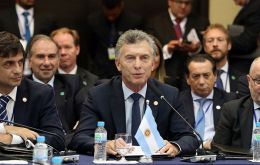
In what was his last international activity, outgoing president Mauricio Macri attended the 55th Mercosur leaders summit in Bento Goncalves, southern Brazil, which he described as a special diplomatic occasion for his administration's strive to put Argentina back in the wide world map.
-
Friday, December 6th 2019 - 09:49 UTC
Paraguay takes the chair of a quarrelsome strained Mercosur
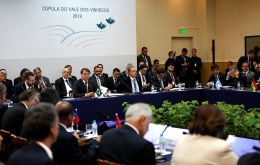
Brazil on Thursday handed over the six-month rotating presidency of the Mercosur trade bloc (Southern Common Market) to Paraguay. During a ceremony at the bloc's 55th summit in Bento Goncalves, Brazil's president Jair Bolsonaro expressed confidence in his Paraguayan counterpart Mario Abdo Benitez and his leadership skills.
-
Friday, December 6th 2019 - 09:47 UTC
Fernandez sends friendly message to Bolsonaro; confirms Solá as foreign minister
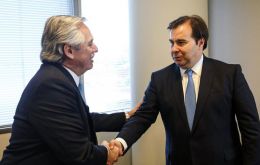
Argentine president elect Alberto Fernandez confirmed Felipe Solá as his foreign minister and Daniel Scioli as ambassador in Brazil, following a meeting with a delegation of Brazilian lawmakers at his Buenos Aires headquarters. The Brazilian delegation was headed by the Lower House president, Rodrigo Maia.
-
Friday, December 6th 2019 - 09:40 UTC
Falklands' fishing companies question government's decision to increase toothfish and calamari fishery fees

Falkland Islands fishing company representatives led by Stuart Wallace of Fortuna Ltd condemned the 50% rise in toothfish and calamari fishery fees at the Fisheries Committee meeting.
